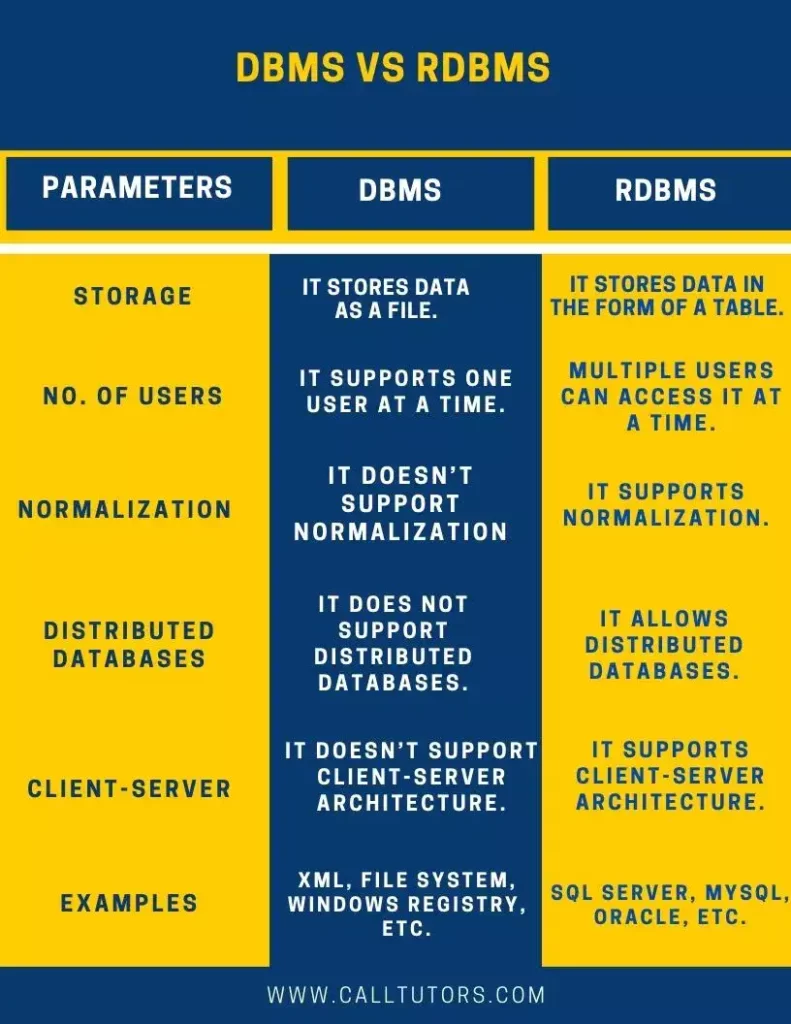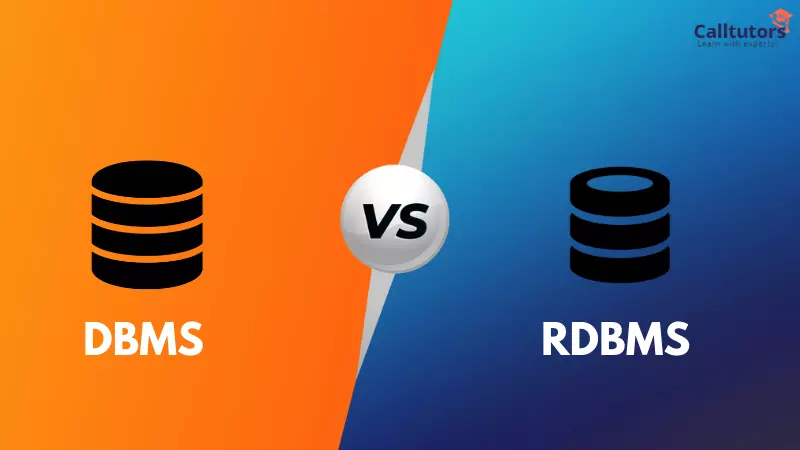Are you interested in knowing the comparison between DBMS vs RDBMS? If yes, then you are at the right place now. We know that the difference between DBMS vs RDBMS is one of the major concerns among all the students. Today, in this blog, you will know about the in-depth comparison or key differences between DBMS vs RDBMS. So, before going deeper, Let’s start with a brief introduction to each of these terms.
What is DBMS?
Table of Contents
DBMS stands for Database Management System, and it is software that is used to store and manage the data. In the 1960s, DBMS was introduced for storing any data. It also offers data manipulation such as data update, data insertion, and data deletion. Remember that it is not limited to the CRUD (create, read, update, delete) operations. It also provides defining as well as controlling options. It helps to get the needed data more accurately to any business or individual who works closely with the databases.
Why Use DBMS?
- It helps to maintain the data uniformity.
- It ensures the effective data integration.
- It increases the end-user productivity.
- Enables the quick decision making.
- It handles the large set of data efficiently.
- It improves the data security and data sharing.
- Database management systems (DBMS) are adaptable; we can use them on computers, tablets, and mobile devices.
Advantages and Disadvantages of DBMS
Advantages of DBMS
Following are the advantages of DBMS:
- DBMS gives several ways to store and retrieve data.
- DBMS works as an effective handler to balance the necessities of various applications by using identical data.
- Uniform administration methods for information.
- Application programmers never revealed the data representation and storage details.
- For storing the retrieving the data efficiently, DBMS uses different powerful functions.
- It offers security and data integrity.
- Integrity constraints are used by the DBMS to provide a high level of security against unauthorized access to data.
- A database management system (DBMS) schedules concurrent data access so that only one user may view the same data at the same time.
- Reduced Application Development Time
Disadvantage of DBMS
Following are the disadvantages of DBMS:
- The DBMS software, as well as hardware cost, is quite high.
- Most database management systems are complex ones, so for users, the training to use DBMS is required.
- In certain businesses, all data is consolidated into a single database, which can be corrupted on storage media due to power outages or database corruption.
- Many people using the same software at the same time might result in data loss.
- A database management system (DBMS) is incapable of doing complex computations.
What is RDBMS?
RDBMS stands for Relational Database Management System, and it is an advanced version of a DBMS system. In the 1970s, it came into existence, and the system of RDBMS allows the organization to access the data more efficiently than the DBMS. It is a software system that is used only for storing the data in the form of a table when it needs to be stored. In this, data is stored and managed in the form of rows and columns, called tuples and attributes. RDBMS is used all over the world as it is a powerful data management system.

Why Use RDBMS?
- It is simple to use.
- For managing the database activities, it allows the database administrators.
- It can handle massive amounts of data uniformly.
- It provides data security and protects against unexpected system power outages and shutdowns.
- Concurrent Access: means that the database can be accessed by more than one connection (user) at the same time.
Advantages of RDBMS
Following are the advantages of RDBMS:
- It’s quite easy to use.
- It is protected by nature.
- The manipulation of data can be done.
- It limits the data redundancy and replication
- It offers better data integrity.
- It provides better physical data independence.
- It offers logical database independence i.e. data can be viewed in different ways by the different users.
- It provides better backup and recovery procedures.
- It provides multiple interfaces.
- Multiple users can access the database which is not possible in DBMS.
Disadvantages of RDBMS
Following are the disadvantages of RDBMS:
- Software is expensive.
- Complex software refers to expensive hardware and hence increases overall cost to avail the RDBMS service.
- It requires skilled human resources to implement.
- Certain applications are slow in processing.
- It is difficult to recover the lost data.
DBMS vs RDBMS: The Key Difference
There are so many differences between the DBMS vs RDBMS. Let us discuss some of the main differences between DBMS vs RDBMS:
1. Any application of DBMS always tries to store the data as a file. It may be used for any file system that runs on a separate operating system and stores everything as a distinct node for a variety of reasons, such as an XML file that stores data in XML.
In contrast, RDBMS application data is stored in tabular form. No matter what data will come, that can be stored easily in any specific table that maintains the proper primary or foreign key relationship. Every transactional data can be inserted in the tabular form very smoothly only by avoiding any duplicity constant.
2. All applications of DBMS store the data in a hierarchical or navigational form that helps to identify files and data properly, mainly in the case of the file system or XML structure in any well-known operating system.
In contrast, the application of RDBMS stores the data in the form of a table. Data is stored always with one unique identifier, and also it maintains the proper relationship with the other tables.
3. Conceptually, DBMS doesn’t follow the approach of normalization. It means DBMS can have data redundancy, it doesn’t have validation properly, or it has a restriction on some database characteristics like insert, delete, or update that doesn’t follow any approach to avoid the duplicate data.
In contrast, RDBMS follows the common normalization approach, as it stores the data in tabular form, always with the help of a unique identifier like a primary key that ensures the avoiding of the automatically duplicated data entries. And also, between the multiple tables, it maintains the proper relationship. So, the data which is of the same kind like master data can be stored only one time, but it is utilized many times on several requirements.
4. DBMS never ensures any approach of security for data, mainly at the time of manipulation of data. As for any database, data manipulation is a difficult task, and at the same, we have to ensure some security, as data is held by DBMS as a file.
In contrast, RDBMS ensures data security. It maintains the integrity constraints properly for following the common characteristics of RDBMS that are popular as the ACID (Atomicity, Consistency, Isolation, and Durability) properties.
5. DBMS application stores the data as a file. So, it is not possible to maintain the relationship between any file’s data. So, in the case of DBMS applications, the data redundancy is always increased.
In contrast, the data of RDBMS is stored in the form of a table, so the relationship between the data and tables is maintained easily, which helps for handling a large amount of data and supports multiple users easily.
DBMS vs RDBMS: In Tabular Form
There are so many differences between DBMS vs RDBMS and some of them are shown below:

| Basis For Comparison | DBMS | RDBMS |
| Storage | It stores data as a file. | It stores data in the form of a table. |
| No. of Users | It supports one user at a time. | Multiple users can access it at a time. |
| Normalization | It doesn’t support normalization. | It supports normalization. |
| Structure | Data is stored in a navigational/hierarchical form. | Data is stored in the form of table where rows contain the values and headers are the names of columns. |
| Hardware/software needed | Needs low software & hardware. | Needs higher software & hardware. |
| ACID | Data may not be stored according to the model ACID and can cause inconsistencies. | It follows the ACID. |
| Distributed Databases | It does not support distributed databases. | It allows distributed databases. |
| Program type | It is a program that is used to manage the databases on computer networks and also the hard system hard disk. | It is a database system that is used to maintain the relationship among the tables. |
| Integrity constraints | It does not support the integrity constraint. | It supports the integrity constraint. |
| Data Access | Data elements need to be accessed individually. | By using the SQL queries, data can be easily accessed, and simultaneously many data elements can be accessed. |
| More suited for | It deals mainly with a small amount of data because it can’t manage big amounts of data. | It is designed for managing a vast amount of data and serving high amounts of data efficiently. |
| Data Redundancy | Data redundancy is common in this. | Keys & indexes don’t allow data redundancy. |
| Data Fetching | For complex and large amounts of data, the process of data fetching is slower. | Data fetching is fast as it uses the relational database approach. |
| Dr. E.F. Codd Rules | It satisfies less than seven rules. | It satisfies 8-10 rules. |
| Data Relationship | There is no relationship between the data. | In this data is stored in the form of table that are related to each other with the help of foreign keys. |
| Client-Server | It doesn’t support client-server architecture. | It supports client-server architecture. |
| Security | It has no security. | It has multiple levels of security as Log files are produced at OS, Command, and object levels. |
| Examples | XML, File system, Windows registry, etc. | SQL server, MySQL, Oracle, etc. |
Conclusion: DBMS vs RDBMS
In this blog, we have discussed DBMS vs RDBMS. And, it is very useful for the students to understand the essential differences between the terms DBMS vs RDBMS. And we hope that now you should know all about DBMS vs RDBMS. And you can decide which one is best for you.
But if in any case, you want our DBMS Assignment Help. Then, feel free to contact us. We are available 24*7 to help you.
FAQs
Why is RDBMS so powerful?
RDBMS is powerful as they need a few assumptions about how data is related or how it will be derived from the database. As a result, a single database may be examined in a variety of ways. The fact that a single database may be extended across several tables is a key characteristic of relational systems.
Why is DBMS better than RDBMS?
The software and hardware requirements for DBMS are modest. However, the requirements for RDBMS are greater. Data redundancy is frequent in DBMS, although keys and indexes do not allow data redundancy in RDBMS.
When should a file-based system be used instead of a database system?
When dealing with small amounts of data, a file-based system should be used.
What are the components of a relational database management system?
A relational database is composed of several major components, including Domains, Tables, Keys, Fields, Schemas, and Instances.



